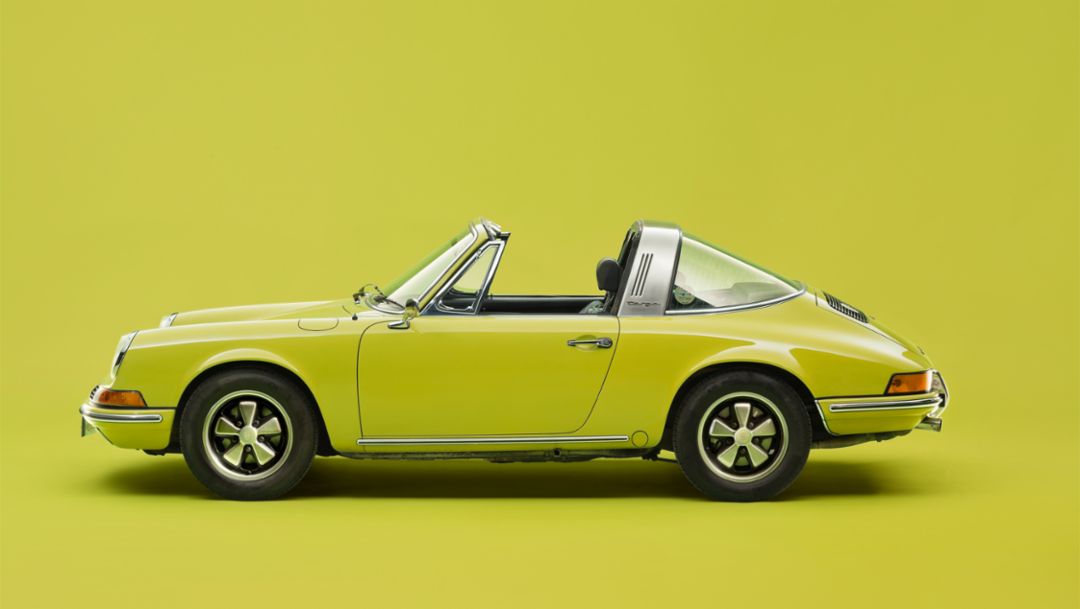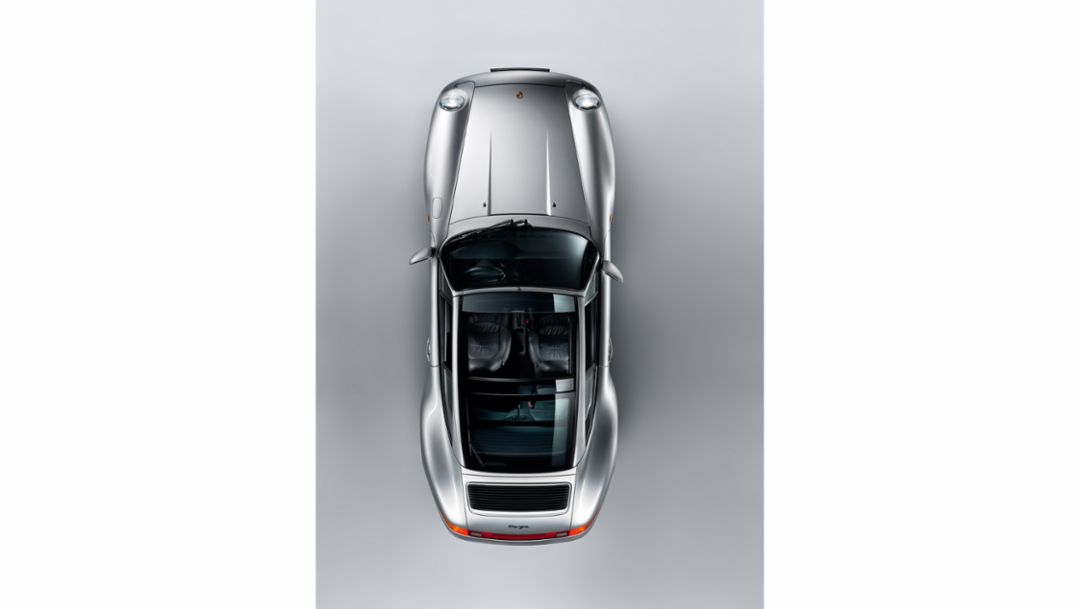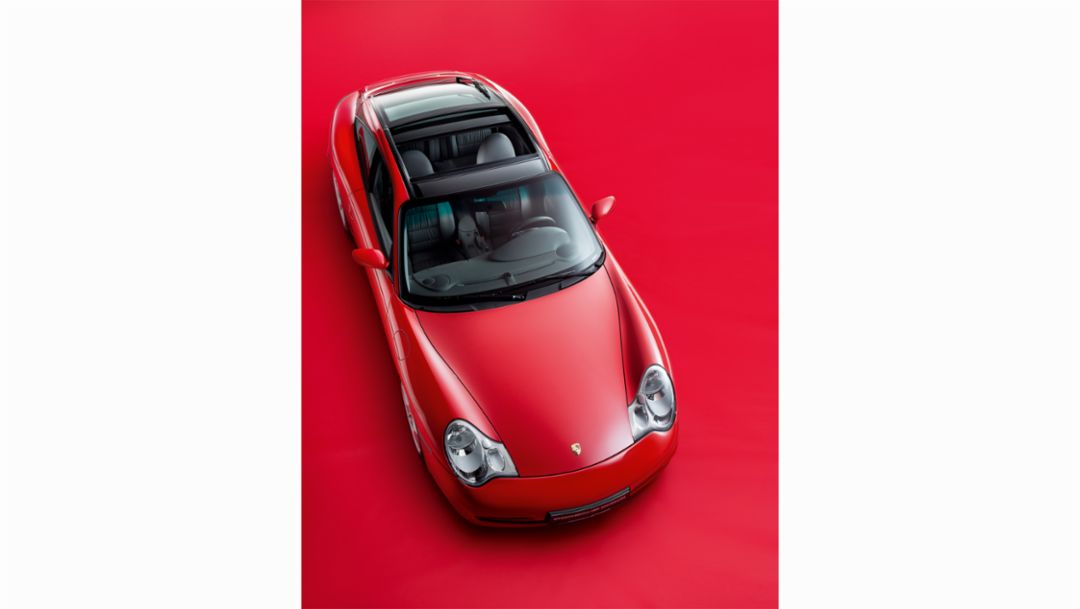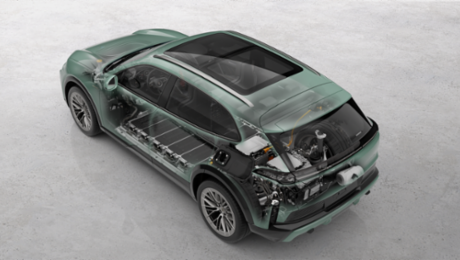The original 911 (1967-1973)—Linden Green (special color)
The first 911 Targa was presented in September 1965. The name came from a rollover protection system, the so-called Targa bar. In the beginning, it had a folding plastic rear window, which was replaced in 1968 by a permanent glass version (photo).
Green wave: Getting the green light: Green is used to indicate actions that are functioning or permitted. Green means go.
G Series (1974-1989)—Grand Prix White
From 1975 onward, the Targa bar was black instead of its previous silver. The removable folding roof was retained in the G Series.
Pure white: From a physics standpoint, white is the sum of all colors. It’s also regarded, without any negative connotations, as the purest of them all. A symbol for light, the ideal, the good.
964 (1990-1993)—Black
With the introduction of the 964 series in 1989, the Targa became available with all-wheel drive for the first time.
Black is beautiful: It’s no coincidence that black is the favorite color of the designers. It blends into the background, letting the form and functionof the sports car command the spotlight.
993 (1996-1998)—Arctic Silver (special color)
With the fourth Targa generation in 1995, a large electrically operated panorama glass roof based on the 993 series made its debut.
On a Silver Platter: Silver is the ideal color for sports cars: It embodies lightness, freedom, speed, and clarity, but can also appear cool and restrained.
996 (2002-2004)—Guards Red
The first water-cooled Targa debuted in 2001 with the 996 series; the rear window was now retractable.
The Red Thread: Red, in a positive sense, is a signal color—a symbol of love. Red stands for playing with fire; in cars as in life, the color of blood embodies vitality.
997 (2006-2012)—Cobalt Blue (special color)
Starting with the 997 series in 2006, all new Targa models now came exclusively with all-wheel drive. And the glass roof was given a sun blind.
Virtuoso Blues: Blue is the color of the distant sky and the ocean, and represents the positive side of the imagination. It is the embodiment of harmony, trust, and reliability.
991 (since 2014)—Racing Yellow
In January 2014, the 991 series Targa made its debut. It features a classic soft top and the fixed rollover bar, with a fully electrical roof mechanism.
Ray of Sunshine: There can be no other color for the sun and light,and therefore alsoenlightenment. So yellow also stands for optimism, joie de vivre, and sensibility.
The Vibrant World of Targa
When did the 911 appear in which colors? Our overview shows the color range available when each new generation went on sale.
The original 911 (1967–1973)
Aga Blue, Black, Slate Gray, Polo Red, Irish Green, Bahama Yellow, Light Ivory, Golf Blue, Sand
G Series (1974–1989)
Grand Prix White, Yellow-Green, Mexico Blue, Peru Red, Cockney Brown, Sahara Beige, Orange, Guards Red, Light Yellow
964 (1990–1993)
Dark Blue, Murano Green, Guards Red, Grand Prix White, Linen, Apricot Beige, Black
993 (1996–1998)
Midnight Blue Metallic, Aventurine Green Metallic, Slate Grey Metallic, Black Metallic, Black, Guards Red, Grand Prix White, Riviera Blue, Amaranth Violet, Speed Yellow, Polar Silver Metallic, Iris Blue Metallic
996 (2002–2004)
Palladium Metallic, Black Metallic, Arctic Silver Metallic, Turquoise Metallic, Arena Red Metallic, Vesuvius Metallic, Guards Red, Pastel Yellow, Snow White, Ocean Blue Metallic, Zenith Blue Metallic, Black
997 (2006–2012)
Lapis Blue Metallic, Seal Gray Metallic, Carmon Red Metallic, Atlas Grey Metallic, Midnight Blue Metallic, Lagoon Green Metallic, Guards Red, Carrara White, Speed Yellow, Basalt Black Metallic, Arctic Silver Metallic, Black
991 (since 2014)
Agate Gray Metallic, Anthracite Brown Metallic, Dark Blue Metallic, Ruby Red Metallic, Aqua Blue Metallic, Basalt Black Metallic, Racing Yellow, Guards Red, Black, Platinum Silver Metallic, Carrara White
Info
Text first published in the Porsche customer magazine Christophorus, No. 372
By Elmar Brümmer // Photos by Rafael Krötz
Consumption data
911 Targa 4: Combined fuel consumption: 9,5 – 8,7 l/100 km; CO₂ emissions: 223 – 204 g/km
_porsche_ag%5B1%5D.jpg)






_porsche_ag%5B1%5D.jpg)
